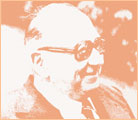 A short biography of the founding President by Josiane Jouët and Christine Leteinturier
A short biography of the founding President by Josiane Jouët and Christine Leteinturier
Fernand Terrou (1905-1976) was a jurist who worked as a public administrator, and subsequently as a professor, and researcher. After world war 2, he was appointed director of the Ministry of Information, where he created the Legal and Technical Service for Information (Service Juridique et Technique de l’Information) which he ran until 1958.
Concurrently, he dedicated himself to teaching and promoting the topic of research in the field of information and media. In 1944, he became a lecturer for the National Foundation of Political Science, where he created the core class entitled “Economics and Legislation of the Press.” In 1947, he published his first key text, “Course on the Legislation of the Press,” in collaboration with Lucien Solal, and created a scientific trimestrial journal entitled “Press Studies” (Etudes de Presse) (1946 – 1960).
In 1951, with the help of Jacques Kayser, he reactivated the Center of Scientific Studies of the Press (Centre d’Etudes Scientifiques de la Presse) that was originally created in 1937 by Mr. Mirkine-Guétzevitch. This led to the creation of the French Institute of the Press or IFP (Institut Français de Presse), which was initially organized as a network between professional journalists, media owner-managers and academics. In 1957, the IFP became an institute for teaching and research with a multidisciplinary approach combining law, history, economics, sociology, semiology, and technology. When it joined the University Panthéon-Assas Paris 2 in 1972, the IFP remained loyal to the multidisciplinary approach of its founder, Fernand Terrou.
Mr. Terrou’s interest for the international aspects of information and media led him to participate actively on issues of freedom of information in the inaugural conference of the UNESCO in Geneva in 1948. In 1955, with the support of the French Commission for UNESCO, he created the French Council of Sciences of Information. Convinced of the need for an international institution that would look beyond the growing divisions caused by the beginning of the Cold War, he contributed actively to the foundation of the IAMCR and became its first president. Because the IAMCR was intended to be a sphere of international exchange, Mr. Terrou wanted it to value the activities of research and teaching of its member institutions and to support the creation of centers of research and documentation, including in developing countries.